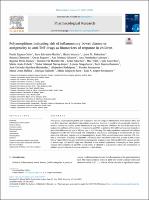| dc.contributor | Vall d'Hebron Barcelona Hospital Campus |
| dc.contributor.author | Zapata-Cobo, Paula |
| dc.contributor.author | Salvador-Martín, Sara |
| dc.contributor.author | Velasco, Marta |
| dc.contributor.author | Palomino Pérez, Laura María |
| dc.contributor.author | Clemente, Susana |
| dc.contributor.author | Segarra, Oscar |
| dc.date.accessioned | 2023-08-23T07:16:24Z |
| dc.date.available | 2023-08-23T07:16:24Z |
| dc.date.issued | 2023-08 |
| dc.identifier.citation | Zapata-Cobo P, Salvador-Martín S, Velasco M, Palomino LM, Clemente S, Segarra O, et al. Polymorphisms indicating risk of inflammatory bowel disease or antigenicity to anti-TNF drugs as biomarkers of response in children. Pharmacol Res. 2023 Aug;194:106859. |
| dc.identifier.issn | 1043-6618 |
| dc.identifier.uri | https://hdl.handle.net/11351/10128 |
| dc.description | Enfermedad de Crohn; Polimorfismo; Pediátrico |
| dc.language.iso | eng |
| dc.publisher | Elsevier |
| dc.relation.ispartofseries | Pharmacological Research;194 |
| dc.rights | Attribution-NonCommercial-NoDerivatives 4.0 International |
| dc.rights.uri | http://creativecommons.org/licenses/by-nc-nd/4.0/ |
| dc.source | Scientia |
| dc.subject | Intestins - Inflamació - Tractament |
| dc.subject | Factor de necrosi tumoral - Inhibidors - Ús terapèutic |
| dc.subject.mesh | Inflammatory Bowel Diseases |
| dc.subject.mesh | /drug therapy |
| dc.subject.mesh | Tumor Necrosis Factors |
| dc.subject.mesh | /antagonists & inhibitors |
| dc.title | Polymorphisms indicating risk of inflammatory bowel disease or antigenicity to anti-TNF drugs as biomarkers of response in children |
| dc.type | info:eu-repo/semantics/article |
| dc.identifier.doi | 10.1016/j.phrs.2023.106859 |
| dc.subject.decs | enfermedad inflamatoria intestinal |
| dc.subject.decs | /farmacoterapia |
| dc.subject.decs | factores de necrosis tumoral |
| dc.subject.decs | /antagonistas & inhibidores |
| dc.relation.publishversion | https://doi.org/10.1016/j.phrs.2023.106859 |
| dc.type.version | info:eu-repo/semantics/publishedVersion |
| dc.audience | Professionals |
| dc.contributor.organismes | Institut Català de la Salut |
| dc.contributor.authoraffiliation | [Zapata-Cobo P, Salvador-Martín S] Instituto de Investigación Sanitaria Gregorio Marañón, Hospital General Universitario Gregorio Marañón, Madrid, Spain. [Velasco M, Palomino LM] Hospital Universitario Infantil Niño Jesús, Madrid, Spain. [Clemente S, Segarra O] Vall d’Hebron Hospital Universitari, Barcelona, Spain |
| dc.identifier.pmid | 37473877 |
| dc.rights.accessrights | info:eu-repo/semantics/openAccess |

 Área privada
Área privada Contacto
Contacto








